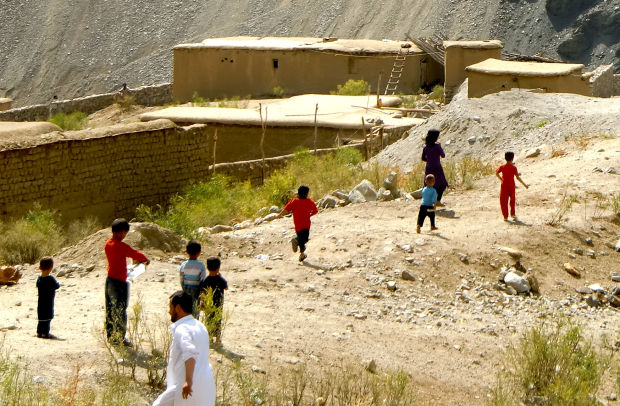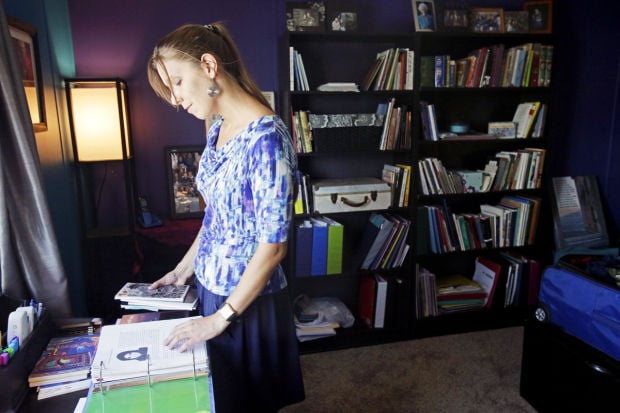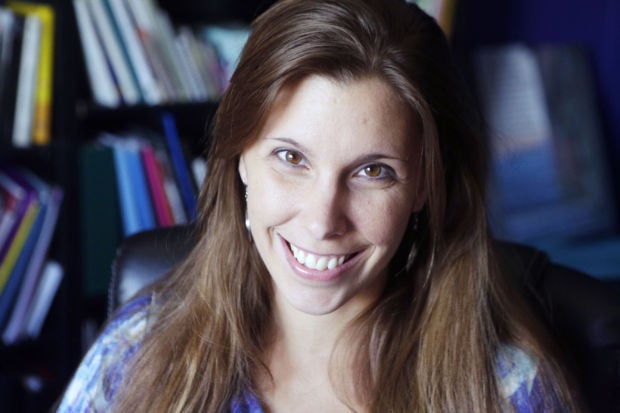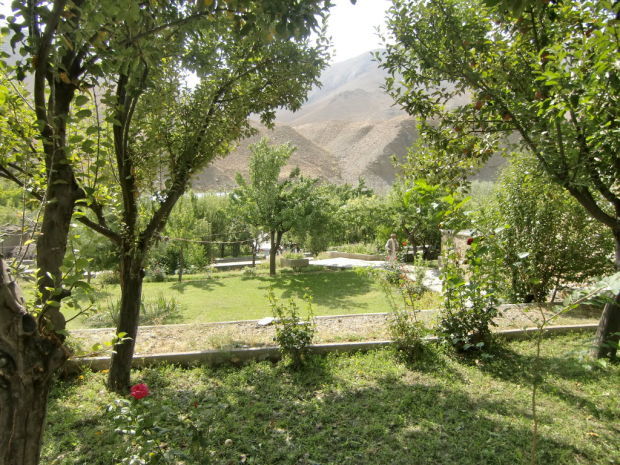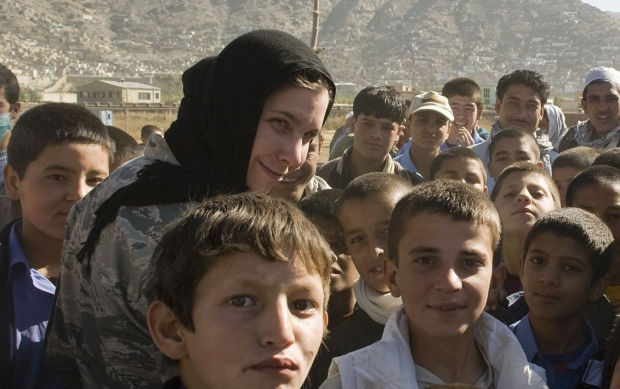Appearing on televised Afghan morning shows wearing her U.S. Air Force uniform and a headscarf, speaking Dari, former Capt. Felisa Hervey broke down walls in the war-torn country.
A natural-born linguist and a poet at heart, Hervey spent two years deployed to Kabul, Afghanistan, most of that time directly engaged in the battle for hearts and minds.
In “Letters to War and Lethe,” her soon-to-be published collection of 20 poems now available for preorder, the 30-year-old daughter of missionaries works through her experience of war, both as a civilian and veteran. In a collection that extends an invitation for peace, Hervey explores not just the damage that many veterans bring home, but also the wisdom.
“There is a part of my soul that really resonates in Afghanistan because of the value they place on poetry,” Hervey said. “Of the arts, poetry is the most sought after, the most treasured and the most ancient, and it’s accessible to everyone because you don’t have to be literate to be filled with poems.”
Hervey’s fluency in Dari (a Persian dialect) and her ability to connect with people took her constantly into the midst of Afghan society — most often covertly, without armed escort — to communicate the anti-corruption mission of the International Security Assistance Force. The idea was to support the people in their efforts to secure a better future.
She influenced social and political leaders, including the president of Afghanistan, according to the citation that accompanies the Bronze Star Medal she received in 2012.
She also organized events such as a 5K run through Kabul to give Afghans a place to say, “Enough, corruption sucks, and we hate it, and we won’t stand for it,” Hervey said. The next year, without any help from her team, the 5K run expanded to five cities, and women ran.
When her deployment ended in 2012, Hervey closed six years of active-duty military service and turned her attention to earning a doctorate in Persian literature from the University of Arizona. A Pat Tillman Foundation military scholar, Hervey is now researching the contemporary poetry of Afghan women for her dissertation.
“In a way, she is also giving voice to the unheard poets in cities of Afghanistan,” said her academic adviser, Kamran Talattof, a UA professor of Near Eastern studies.
Hervey also helped found Civil Vision International, a Tucson-based nonprofit that uses social media to continue the global dialogue she began in the military. The Facebook page has more than 94,000 likes.
CHILDHOOD ABROAD
Hervey’s decision to join the Air Force had stunned her family.
“We were surprised because Felisa has always been unique and individual, so to imagine her fitting into a regimented situation where everyone would look and act the same and talk the same did not seem that it would be easy for her to do,” said John Hervey, Felisa’s father.
The integrity of service had attracted her.
The second-oldest of six children, Hervey grew up in a missionary family — her father was a pastor, her mother, Debbie, a midwife — first in Chile and then Kazakhstan as a teenager.
In post-Soviet Kazakhstan, she lived in a culture newly embracing certain freedoms and discovered her own love of language. As her family introduced Christianity to a community exploring religious freedom, they began to hear about a growing danger from the Taliban, an Islamic fundamentalist political movement in Afghanistan that would shape her future.
As a teen yearning for friends, Hervey immersed herself in the Kazakh language, more difficult to learn than the Spanish and English she grew up speaking. She opted to attend a Kazakh school in addition to her English schooling at home and on the Internet, her father said.
“Some days I would spend five hours language learning, and I had recordings and I would be washing dishes or in the shower and I would just be playing these recordings,” said Hervey, who now speaks English, Spanish, Kazakh, Persian and Russian fluently. Arabic is next. “I think that was transformational in my life because I realized that it was possible to connect across this divide of culture and language, and the effort meant something.”
WHEN THE WORLD SHIFTED
Hervey finished her last two years of high school in California, but she had not seen the last of Central Asia. She received her appointment to the United States Air Force Academy in Colorado Springs in June 2001.
And then everything changed.
“We were not at war anywhere in the world, and that was a bit of a shock to all of us in September of that year,” Hervey said of the terrorist attacks on Sept. 11, 2001. “Our world was changing before all of our eyes, and for those of us entering the military at that time ... and actually going into active duty, that was very real to us and very sobering to us. None of us really knew what that would mean. We just had a sense that it would involve us.”
Hervey felt she would eventually be deployed to Afghanistan, but she wanted to go immediately to experience the country first as a civilian. She and two classmates took a leave of absence from the academy to work in Kabul, teaching English in an orphanage from 2003 to 2004. There, she became fluent in Dari.
She thinks her poetry from that era lacks the depth she later developed through military service, but in that time she came to be known as Farzana Marie, the pen name she writes under today. Farzana means “wisdom” in Dari, and Marie, her middle name, blends her past with who she is today.
That person continued to mature. She returned to the academy, graduating in 2006 with her commission as a second lieutenant.
“She is so optimistic and makes me even hopeful,” said Zarifa Hamidi, one of the primary school students Hervey taught at the orphanage. The two reunited during Hervey’s deployment, and Hamidi keeps up with her friend’s writing. Now 20, she attends Salve Regina University in Newport, Rhode Island.
THE TWO-YEAR TOUR
Hervey was stationed at Davis-Monthan Air Force Base in 2008, and deployed to Afghanistan in 2010.
Col. Tim Kirk, now retired, met Hervey toward the end of her initial six-month deployment in which she had been assigned to a base job that kept her from authentic Afghan interaction.
Struck by her proficiency in Dari, Kirk, 43, asked Hervey to extend her deployment and lead an outreach team focused on changing Afghan perceptions about local corruption and U.S. military efforts. She agreed to an 18-month extension, forgoing an assignment teaching ROTC at the University of Arizona.
“I knew this would change my life, but I said, ‘Yes, there is nothing I would rather be doing than this,’” Hervey said.
During her unusually long two-year tour, she carried out more than 300 tactical missions “outside the wire” — off post, earning the Bronze Star Medal, which is the fourth-highest individual military award, Kirk said, noting that most people leave the base 100 to 200 times.
While she never saw direct combat, her base was attacked and transport flights saw rocket fire. Undercover missions can be even more dangerous, Kirk said.
“The other kind of mission, you’re going out with guns and drones overhead, and people are there to bail you out,” he said. “If you go out on a clandestine mission, it’s just you by yourself. If you get in trouble, all you have is a tiny pistol in your backpack.”
As Kirk worked with Hervey on the task force, he let her lead, presenting to Afghan citizens the deference of a higher-ranking male officer to a younger female officer. He continues to work with her as executive director of Civil Vision International.
“It was so much more than language,” Kirk said. “She was connecting with people on an emotional level. She was by far the most important secret weapon that we had going for us, because she immediately disarmed everyone she came into contact with.”
That included a high-ranking Afghan official, a former warlord known for his disapproval of American attempts to speak Dari, Kirk said.
An American adviser encouraged Kirk and Hervey to stick to English, warning them that “he will rip you apart by exposing what you don’t know about the language,” Kirk said.
He encouraged Hervey to go for it. “Not only does he not throw her out, but he is enamored with her and wants to have her over to his house for dinner and introduce her to his family,” Kirk said. “It was just really powerful and that was the level of connection she was able to make instantaneously with any Afghan.”
In those years, poetry surfaced more as a conversation topic than a craft. Working long hours seven days a week, Hervey wrote primarily to process intense emotions dealing with deaths of friends killed in combat.
“It was vivid moments like that where it seems like only poetry will do,” she said.
POETRY AND PURPOSE
Always a writer, Hervey uses poetry to connect, both in Tucson and Afghanistan.
“Everywhere we would go, she would talk poetry with the Afghans and the conversation immediately revolved around that for the rest of the time,” Kirk said. “It was a really vital part of her ability to connect to people and understand the significance of poetry and that she knew Afghan poetry and could recite it just meant so much to the people. We were lucky as could be to have her on the team.”
Hervey talks about some of her experiences in “Hearts for Sale! A Buyer’s Guide to Winning in Afghanistan,” which she published in March 2013 through Worldwide Writings. The book, written from insights she shared in a military report, expresses Hervey’s hopes for Afghanistan. In recommending the book, Army Maj. Gen. H.R. McMaster writes in the foreword that Hervey “clearly identifies important ways for us to continue our support for the Afghan people in this latest phase in their long struggle for peace and justice.”
John Hervey remembers the yurt, or Central Asian tent, his daughter set up in her Tucson backyard. For a time, she hosted diverse gatherings, inviting people of all religions, ethnicities and nationalities to drink tea, read poems and tell stories. He called those meetings “magical.”
“Everywhere she goes, she seems to bring people closer to each other and to God,” the 60-year-old Hervey said.
The Herveys served in Chile under the Episcopal Church, but today Hervey — who religiously identifies herself as a follower of Jesus Christ — meets with both Christian and Muslim families in a small home church that explores the differences and similarities between the faiths. She sees Jesus as someone who broke cultural boundaries to love people.
“I want to live my life in a way that refuses to forget that every single person, regardless of how different in faith, background and ethnicity is a precious human being and one worth fighting for and one worth defending and one worth connecting with,” Hervey said.


